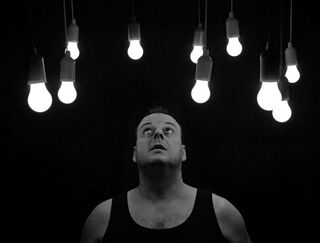Sexual Orientation
The Other “Q”: Questioning One's Gender or Sexual Orientation
With "questioning," some continue to explore their sexuality and gender.
Posted July 2, 2021 Reviewed by Devon Frye
Key points
- "Questioning," part of the Q in LGBTQIA+, refers to individuals who are questioning their sexual orientation or gender identity.
- Questioning is a valid sexual or gender identity—as are all sexual orientations or gender identities.
- Questioning one’s sexuality orientation or gender identity is not limited to youth. One’s sexuality is not static.
- Reasons behind questioning have varied socio-psychological origins.
In bringing up “Q,” I am not referring to the politically-based/conspiracy theory/scratch-my-head phenomenon. Nor am I referring to the “Q” in LGBTQIA+ as queer. Instead, I am referring to that “Q” as questioning.
Typically, LGBTQIA+ is not written out as LGBTQQIA+ to make a distinction between queer and questioning, although some would prefer that allowance be made. Questioning refers to individuals who are questioning their sexual orientation or gender identity. Research on sexual orientation or gender identity has been rather neglectful of those who identify as questioning, yet there is a wealth of avenues to pursue.
“Do We Really Need This Category?”
I often hear, “Why do we have to complicate all this with a different name for everything? Can’t we just use heterosexual and homosexual?” No. I’m sorry if it’s confusing for some, but a binary like that excludes individuals and/or does not truly capture their sexual identity.
Being demisexual, for example, is not about being straight or gay; it’s about emotional attachment. The same applies to being sapiosexual; it’s about intellectual attachment. You cannot pigeonhole someone who identifies as demisexual or sapiosexual into a binary. We simply do not live in a binary reality.
Furthermore, sexuality isn't just about being heterosexual or not. Heterosexuality has long been viewed as the default, but this isn't in fact the case. I answer it the same way when someone asks why we need “cisgender.” Again, no group of people should hold the position of being the default.
Are People Who Are Questioning Just Confused?
No. It’s a mistake to conflate questioning with confusion. It often originates from a sense of curiosity. We question things constantly, but it doesn’t mean we are confused. If I’m in a restaurant and am questioning whether I should have chicken parmesan or chicken marsala, it doesn’t mean I’m confused about chicken or my taste in chicken dishes.
Sexuality is not static. Sexuality can be fluid over the life course. Sexuality is too complex to pronounce it to be fixed. There is no immediate proclamation at the age of five, “I am a heterosexual!” and your life progresses in a systematic manner from that point.
Most individuals are born with the capacity to have sexual impulses. Those impulses fashion sexual desires that motivate sexual behavior. Throughout life, many react to different, and sometimes conflicting, sexual impulses. Those reactions have some people questioning who they are sexually. It’s not about confusion; it’s about considering who they are. This is a part of the development of sexual selfhood.
Stigmatization of groups of people develops with such claims as “They are just confused” or any deviation of societal adherence to sexual-normative scripts. Questioning is a healthy developmental process for anyone.
Questioning as a Young Person's Game
Questioning one’s sexual orientation or gender identity is not limited to youth. While young people may question as they learn the social meanings placed on sexuality and begin to deal with the sexual impulses they experience, and teenagers and young adults may experiment with different sexual behaviors to satisfy curiosity, questioning is not limited to the young.
Questioning can be transitory, periodic, or ongoing for individuals adopting this identity. In my own research, participants, some of which identified as questioning, continued to experience moments in their life course in which they attempted to come to terms with a variety of sexual impulses. These participants included individuals north of fifty years of age. Age, class, marital status, etc., have no bearing on limitations of questioning.

Qualitative Research of Questioning Individuals
A pair of studies conducted by Elizabeth M. Morgan and colleagues took a quantitative and qualitative approach to gaining insight into individuals who claimed to have questioned their sexual orientation at least at one point in their lives. The first study (Morgan, Steiner, and Thompson, 2010) included 184 male college students. Of this sample, 149 identified as heterosexual and 35 as a sexual minority. Fifty-three percent of the first group and all of the second group indicated that they had questioned their sexual orientation at some point.
Narratives derived from the study sample provided a glimpse into the questioning process of each individual who claimed to have questioned their sexual orientation. One participant’s questioning process began with meaning-making associated with sexual development and identity:
I grew up in a very diverse and liberal environment, and my parents had a couple gay/lesbian friends. I learned about homosexuality early on, and I probably questioned my sexuality at a young age, to make sure that I indeed was attracted to members of the opposite sex (2010:435).
For some, the questioning comes as a curiosity stemming from an impulse:
Until about a year ago I never really questioned that I was attracted to women. However, more recently I’ve become a bit more curious as to what having sex with a man would be like. There is a mild desire to do so, but I am not attracted to men enough to act on that desire (2010:436).
For others, the process is potentially ongoing:
There were many points throughout my life when I stopped and asked myself if I might be attracted to men. I have decided each time that I do not find men sexually attractive, but I am still open to the idea if my mind should change in the future (Ibid).
In a second study (Morgan and Thompson, 2011), 333 female college students participated, with 228 respondents taking the identity of heterosexual and 105 indicating a sexual minority identity. Processes within the narratives in this study often mirrored those in the male narratives. However, in the female study, there was more indication of sexual or romantic behaviors in same-sex interaction in the questioning process than in the male study.
Again, there was further indication that questioning can span, at least, a significant portion of one’s life. As one participant in Morgan and Thompson’s study mentioned:
I’ve questioned my orientation a million times, and still do. The first time I did I was about 12 (2011:22).
Another respondent put it more in terms of the person rather than sexual allurement:
I suppose I’ve thought about it. I believe (or like to hope) that everyone is bisexual and that you don’t choose whom you’re involved with by a single characteristic (like gender, race, religious beliefs, etc.) and that you fall for or are interested in the person (ibid).
One respondent discussed questioning originating in social connections:
The issue of my sexual orientation probably arose first in 9th grade when I became involved with the gay-straight alliance at my school. As a result of my experiences I often question my sexual orientation and wonder if I am attracted to women (2011:23).
Finally, one more participant refuted the idea of those who are questioning coming from a place of confusion:
I never really questioned my sexual orientation for much of my life, but have a little since coming to college. Not so much because I feel confused but because there are so many people here who are open with their sexuality, which leads me to consider my own (ibid).
There is Much More to Explore with Questioning
What I have presented here is far from a complete explanation of individuals who identify as questioning—the surface is barely scratched here. While I have largely leaned on sexual orientation for the purposes of illustration, it is important to acknowledge that questioning includes gender identity and not just sexual orientation. Those who identify as questioning deserve the same attention and respect as any other gender or sexual identity. Furthermore, scientific research needs to cease neglecting this topic and more thoroughly investigate those who are questioning, so everyone can benefit from a more robust understanding.
References
Morgan, E. M., Steiner, M. G., & Thompson, E. M. (2010). Processes of sexual orientation questioning among heterosexual men. Men and Masculinities, 12(4), 425-443.
Morgan, E. M., & Thompson, E. M. (2011). Processes of sexual orientation questioning among heterosexual women. Journal of Sex Research, 48(1), 16-28.




